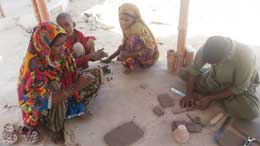Heritage Foundation is focusing on training and capacity building which allows it to disseminate its methodologies to marginalized sections of the society, especially women. You! takes a look
Heritage Foundation is focusing on training and capacity building which allows it to disseminate its methodologies to marginalized sections of the society, especially women. You! takes a look
Heritage Foundation is a non-profit cultural and social organization engaged in documentation and conservation of Pakistan heritage and humanitarian assistance. Co-founded by Yasmeen and Suhail Zaheer Lari in 1980, the Foundation has been instrumental in saving significant landmarks such as the Quaid-e-Azam House Museum, the Mohatta Palace, Hindu Gymkhana in Karachi, and GPO Lahore, which might otherwise have been pulled down.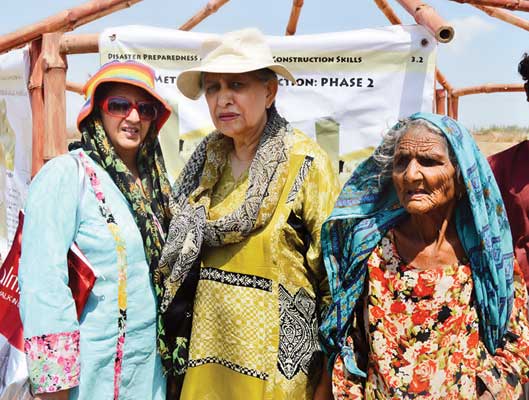
HF also works on training various segments of marginalised communities in order to provide them technical skills to place them on the road to self-reliance. When the massive 2005 earthquake struck, the Foundation got engaged in helping the affected communities in Hazara and Azad Kashmir. It also played a significant role in the rehabilitation of people in Swat and Upper Sindh who were affected by 2010 and 2011 floods respectively.
Since 2011 the Foundation has begun extensive trainings, especially for shelter construction and green skills. The Foundation works through a secretariat/research centre in Karachi. It has training centres in eco village Moak Sharif, and Sayani DRR Park, Kot Diji with camp offices and Base Camp in Battal, Hazara, where trainings for low cost/no cost techniques are imparted to rural communities, particularly women. It has no offices per se but does set up field offices whenever working in flood or earthquake areas. For example at the moment a field office is operating in Shangla where local artisans have been trained who are helping to build 200 earthquake-proof shelters using mud, lime and bamboo. All the design and direction for activities are carried out on an honorary basis by CEO Yasmeen Lari, especially in devising ways to build zero carbon footprint low cost structures, or working out heritage conservation strategies.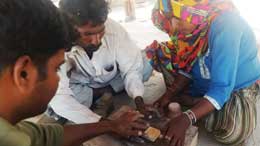
The Foundation is focusing more and more on training and capacity building which allows it to disseminate its methodologies to a large number of people, particularly marginalized sections of society, especially women.
The Makli Project:
Since its inception in 1980 Heritage Foundation of Pakistan has been committed towards the goal of preserving the cultural and historical heritage of Pakistan, with their recent efforts concentrated on the preservation of Makli necropolis and the intangible heritage of the adjoining village. The preservation strategies and conservation works of a few monuments have been undertaken since 2012. The Makli Goth is an offshoot of the conservation works, and essential in order to make the mendicant and beggar community that lives in the shadow of the great necropolis, to become productive citizens.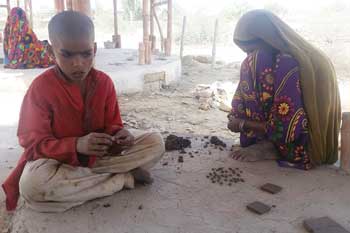
.jpg)
Although attempts at developing interaction with the mendicant community began in 2015, the work in Makli Goth was taken up in earnest in January 2016. On 12th March, the mendicant community, living in Makli village, was given a special treat in the form of Ghaaran Jo Melo - Family Festival - a celebration of self-reliance initiatives introduced by Heritage Foundation that included the distribution of 50 toilets which are being finished by the household themselves, and the provision of skill training for 'chulahs' to the local community. This CSR event was a joint venture by the Heritage Foundation Pakistan and Starlinks.
"We will continue working until we are able to achieve a change in mindset of the community to become more productive and self-reliant. Since it is a slow process it may take a few years before we can be completely successful," says Shanaz Ramzi, who has been associated with the Foundation since 2000 and is now one of the members of Board of directors of Heritage Foundation.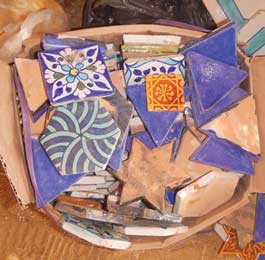
While giving details to the distribution of 50 toilets among the villagers, Shanaz Ramzi enunciates, "Since there is open defecation which is among the greatest factors for diseases and ill health among villagers, and since the Lari OctaGreen (eco-toilets) designed for Earthquake 2015 in the north had been successful as a prefabricated unit, the idea of building toilets was promoted among the community through a couple of young men of the community. They were taught how to make prefabricated structures and offer it to the community at a cost of Rs. 200 each (it costs Rs 5000 each to the Foundation). However, the important aspect was that the households were collectively willing to purchase them, install them and finish them themselves. This was a significant step as for the first time the community agreed to participate in a programme where they paid for the facility (even though it was only Rs 200) and also agreed to finish them and then use them regularly."
As far as the provision of skill training for 'chulahs' to the local community is concerned Shanaz explains, "The chulah is the Karavan PakoSwiss stove. It is designed by Yasmeen Lari with an earthen platform, is fuel efficient and smokeless. In addition, it provides hygienically cooked food and dignity to women by elevating them from the filthy ground to a raised platform. Since the Foundation's trained Barefoot Entrepreneurs have taught the other rural women how to build their chulah kitchens, these have become the joy of the housewives, and their pride is manifest in the way they cook clean food and serve it to their families."
The revival of kashi work:
Although Sindhi kashi has been famous for centuries, unfortunately, the art of kashi is dying. Since the Foundation has been engaged in various works at World Heritage Makli, it was decided to revive the ancient glazed tiles (kashi) in Sindh. Through research it was found that there are still 20 monuments at Makli that carry remnants of kashi. Since Yasmeen Lari has been a UNESCO consultant and the work of the Foundation has been well-known to UNESCO; the Foundation requested UNESCO to arrange for ceramic experts so that together with local master kashigars (kashi artisans) from Hala and Nasrpur, the entire process should be reviewed. This is expected to help in reaching the goal of producing world-class kashi.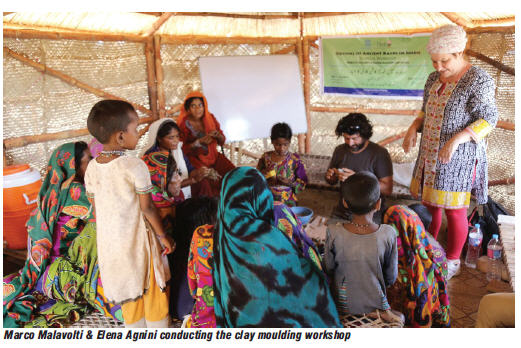
The workshop:
As the Foundation had already been able to get a couple of the Goth women to begin working on production of small glazed tiles, on the Foundation's request UNESCO's Italian experts agreed to conduct workshops for women and children of the Goth. Recently, two experts from UNESCO Ms Elena Agnini and Mr Marco Malavolti came to Makli and conducted a week-long workshop with the objective of helping local artisans to explore, improve and record their traditional crafts through scientific methods in order to evolve the age-old practices and processes.
The workshop saw the experts visiting the kilns and meeting with the artisans at Makli to discuss the traditional methods used for the fabrication, painting and firing of kashi tiles. Marco Malavolti demonstrated various methods of making moulds either for single use or multiple uses to speed up the existing process. As is the modus operandi of Heritage Foundation, women and children were also given introductory training on clay modelling by Elena and Marco, which was appreciated and enjoyed by all.
A better tomorrow:
The Foundation is taking steps to provide training to several women of Makli Goth engaged in various processes: from making proper modelling clay to making casts, grinding colours and applying glazes. Accordingly, Makli Goth can become the centre for supplies of certified items for use in production of kashi. Considering that a couple of women have already been able to market their product of small glazed tiles among the visitors to the shrines, there is much hope that this craft can become a valuable income generating activity for them.
The Foundation has also devised small kilns, which can be easily built in villages, and is working on popularizing the craft through schools in rural areas of Sindh.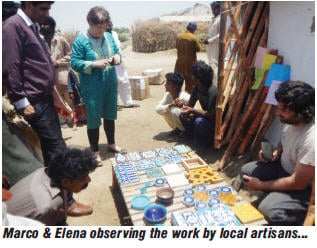
Highlighting the future activities of the Foundation Shanaz reveals, "While the Foundation continues to work in disaster areas, such as those affected by floods and earthquakes (currently engaged in helping build 200 shelters in Shangla), its major project is the launch of a non-profit knowledge and training TV channel for disadvantaged and distant communities. LBA (LariBarefoot Academy) content has several segments including Kids Transmission which aims to develop a 250-word English and Urdu vocabulary (over one year), crafts, heritage and environment, and teach about other primary educational aspects presented in an entertaining manner. There is a special segment for the Women's Transmission which aims to provide information regarding various issues of health and hygiene, family planning and rights etc," she concludes.
Landmark achievements of the Heritage Foundation
